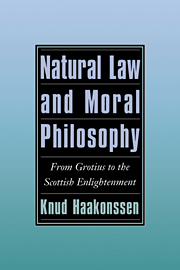Book contents
- Frontmatter
- Contents
- Acknowledgements
- Introduction: The Scottish Enlightenment in the history of ideas
- 1 Natural law in the seventeenth century
- 2 Natural law and moral realism: The civic humanist synthesis in Francis Hutcheson and George Turnbull
- 3 Between superstition and enthusiasm: David Hume's theory of justice, government, and politics
- 4 Adam Smith out of context: His theory of rights in Prussian perspective
- 5 John Millar and the science of a legislator
- 6 Thomas Reid's moral and political philosophy
- 7 Dugald Stewart and the science of a legislator
- 8 The science of a legislator in James Mackintosh's moral philosophy
- 9 James Mill and Scottish moral philosophy
- 10 From natural law to the rights of man: A European perspective on American debates
- Bibliography
- Index
9 - James Mill and Scottish moral philosophy
Published online by Cambridge University Press: 05 June 2012
- Frontmatter
- Contents
- Acknowledgements
- Introduction: The Scottish Enlightenment in the history of ideas
- 1 Natural law in the seventeenth century
- 2 Natural law and moral realism: The civic humanist synthesis in Francis Hutcheson and George Turnbull
- 3 Between superstition and enthusiasm: David Hume's theory of justice, government, and politics
- 4 Adam Smith out of context: His theory of rights in Prussian perspective
- 5 John Millar and the science of a legislator
- 6 Thomas Reid's moral and political philosophy
- 7 Dugald Stewart and the science of a legislator
- 8 The science of a legislator in James Mackintosh's moral philosophy
- 9 James Mill and Scottish moral philosophy
- 10 From natural law to the rights of man: A European perspective on American debates
- Bibliography
- Index
Summary
Introduction
James Mill is commonly known as the utilitarian theoretician of government, law, and education and as the leader of the circle of radical political activists who worked to apply Bentham's ideas to virtually all the social, political, and legal problems of the first half of the nineteenth century. This view is certainly true in so far as any overall assessment of Mill's work must see Bentham's utilitarianism as by far the most important influence on it – even allowing for some truth in John Stuart Mill's contention that his father reached a measure of philosophical independence by combining elements from Hartley, Malthus, and Ricardo. The purpose of this chapter, however, is confined to elucidating the structure of Mill's thought by reference to the moral philosophy in which he was first educated and with which his later Benthamite utilitarianism had to come to terms – or which had to come to terms with his utilitarianism.
This moral philosophy was the extraordinarily complex and composite Scottish academic tradition, which, especially in the work of Dugald Stewart, tried to encompass ideas derived from David Hume, Adam Smith, the idiosyncratic eclectic Adam Ferguson, and the Common Sense philosopher Thomas Reid. From a philosophical point of view, these conflicting lines of Scottish moral thought may seem to be transcended by the mature Mill's Benthamite utilitarianism, and yet, as is argued in the second half of this chapter, closer consideration will show that Mill's utilitarianism has some fundamental affinity with one strand of the Scottish legacy, namely the objectivist moral theory of the Common Sense school.
- Type
- Chapter
- Information
- Natural Law and Moral PhilosophyFrom Grotius to the Scottish Enlightenment, pp. 294 - 309Publisher: Cambridge University PressPrint publication year: 1996



